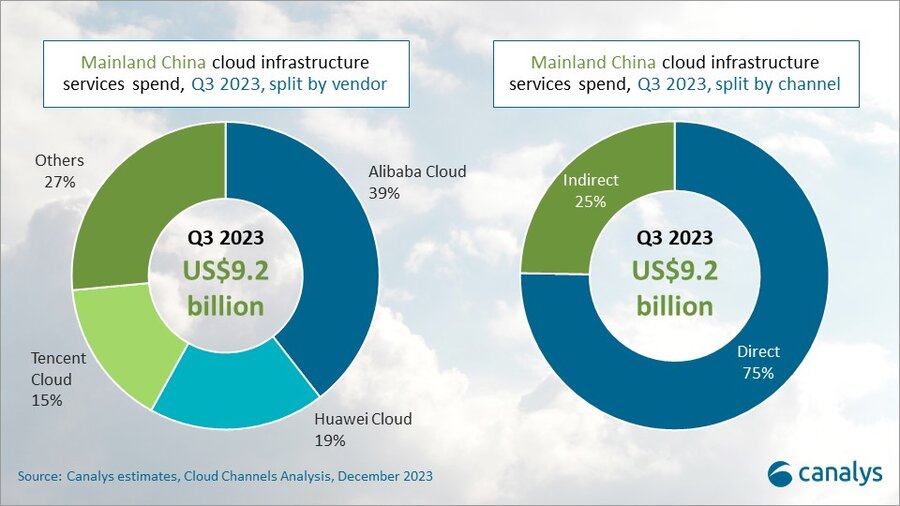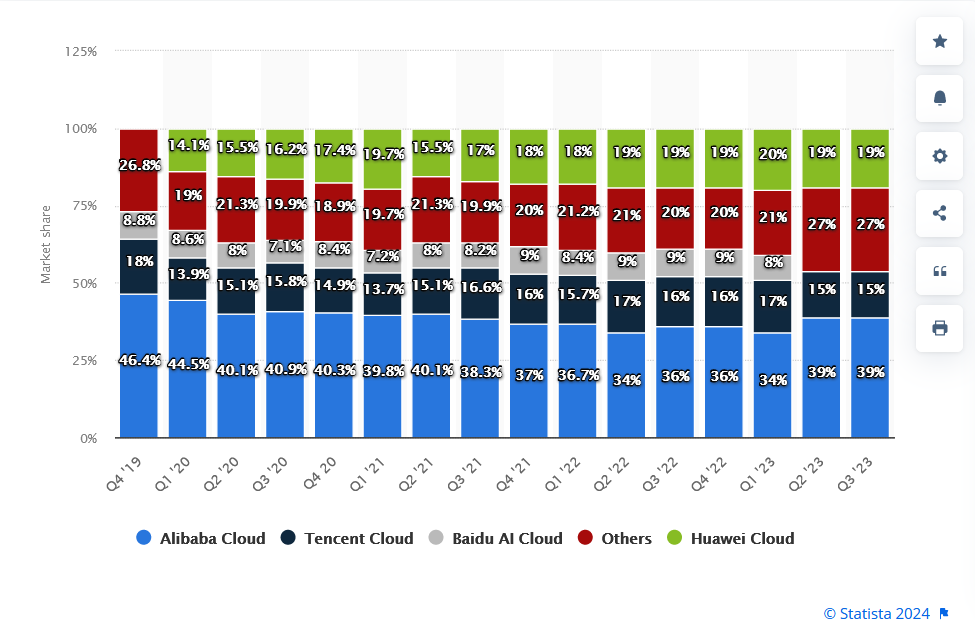Choosing The Right Cloud: A Deep Dive Into China's Cloud Providers
Introduction
Kicking off a new project (still work in progress, so stay tuned), my partner and I decided to tap into the Chinese market for its massive customer base. As a result, I had to get real cozy with regulations there, and pick a cloud provider carefully to run the service on. Despite growing up in China, my cloud game got strong only after I moved to Canada, thanks to AWS, Google Cloud, and the like. So, yeah, the cloud scene back in China? Kinda felt like starting from scratch. I spent a good chunk of the last few days digging into what China's got to offer in the cloud department, and I've got some nuggets of wisdom to share. If you're also thinking about stepping into the Chinese market, stick around. I've done the homework so you don't have to!
The Dominance of Chinese Cloud Providers
The top cloud providers in China are Alibaba Cloud (Aliyun), Tencent Cloud, Huawei Cloud, and Baidu AI Cloud. Together, these four Chinese companies control over 75% of the country's cloud infrastructure services (IaaS) market. In contrast, the market share of AWS and Microsoft Azure in China remains relatively small. Here are some data I found from Canalys and Statista:


Alibaba Cloud is the clear market leader, with a 39% share. As the cloud arm of e-commerce giant Alibaba, Alibaba Cloud has benefited greatly from the explosive growth of China's digital economy and e-commerce sector. Tencent Cloud (15% share) and Huawei Cloud (19% share) have also capitalized on the strengths of their parent companies in social media/gaming and telecommunications, respectively.
Service Offering Comparison
I didn't get into the nitty-gritty of every service or feature offered by all of China's cloud providers. Instead, I zeroed in on some of the services I use daily on AWS and looked for their counterparts on Alibaba Cloud and Huawei Cloud, the two big players in the market.
Here's what I found:
| AWS | Alibaba Cloud | Huawei Cloud |
|---|---|---|
| EC2 | Elastic Compute Service - ECS | Elastic Cloud Server - ECS |
| S3 | Object Storage Service - OSS | Object Storage Service - OBS |
| SQS | Message Service - MNS | Distributed Message Service - DMS |
| Lambda | Function Compute - FC | FunctionGraph |
| DynamoDB | ApsaraDB for MongoDB | Document Database Service - DDS |
| CloudFormation | Resource Orchestration Service - ROS | Cloud Stack |
Without diving deeper, it's a fair bet to say that either Alibaba Cloud or Huawei Cloud should cover all the major features I need for my service. Plus, I could keep the architecture pretty consistent, allowing me to run my service on one of these Chinese cloud providers for the Chinese market and switch to AWS for markets outside China.
But why not pick AWS for China market? First, as I mentioned before, AWS doesn’t have as big of a footprint in China compared to the other major players. Second, there’s the fact that AWS in China is limited to just two regions (Beijing and Ningxia), both of which are quite a distance from the densely populated southern areas. Third, honestly, there’s always this nagging worry in the back of my mind that political tensions between the US and China might one day put AWS users in a tough spot. Considering all this, I leaned towards choosing a cloud provider that’s fully rooted in China.
On top of that, running services in China market requires me to meet numbers of legal and compliance requirements, like ICP (Internet Content Provider) filing/license, PSB (Public Security Bureau) filing etc. Local cloud providers provide services to assist in navigating these requirements, which I couldn’t find with AWS China.
Dive Deep Into The Developer Experience on Alibaba Cloud (Aliyun)
If we put AWS and Alibaba Cloud together, there are quite a lot of similarity, along with some differences.
Both Alibaba Cloud and AWS originated from the cloud computing needs of their parent e-commerce companies (Alibaba and Amazon respectively). This has given them strong capabilities in areas like elastic scaling, compatibility, and storage for e-commerce workloads. However, Alibaba Cloud has some distinct advantages in the Chinese market. It has a wider network of data centers in China, allowing for quicker and cheaper services due to its local presence. Alibaba Cloud also integrates better with the unique Chinese digital ecosystem, including popular local platforms and services. Additionally, Alibaba Cloud has been growing rapidly, with its cloud computing revenue growing 50% year-over-year, higher than AWS's 39% growth. This rapid expansion has solidified Alibaba Cloud's dominance in the Chinese market, where AWS has a much smaller presence.
Considering the market share, it seems there's hardly any reason not to start with Alibaba Cloud (keeping in mind I can always switch later). But before I make that decision, I'm also interested in what the developer experience looks like on Alibaba Cloud.
For that, I created an account and built a "hello-world" serverless app on it. In general, the developer experience on Alibaba Cloud is very similar to AWS, which is a good news to people who is familiar with AWS (like me). Here are my key takeawys:
- In contrast to AWS, Alibaba Cloud starts with all services turned off by default. This means you have to opt-in to enable each service you want to use, including basic ones like OSS (the equivalent of S3).
- Alibaba Cloud sets a very high standard for authentication. I found myself entering codes from text messages countless times while clearing out "garbages" from my testing. While I completely understand and appreciate the security measures, it's hard to imagine how someone without a mainland China phone number would manage this.
- Function Compute (the equivalent of Lambda) offers an neat feature where a function can be invoked via HTTP requests. This eliminates the need to configure an API Gateway in front of the Function Compute function, simplifying the setup. Moreover, should there be a need for an API Gateway for other purposes, I have the option to establish an event-driven Function Compute function linked with the API Gateway.
- Just as SAM facilitates the rapid development and deployment of serverless applications on AWS, Alibaba Cloud introduces Serverless Devs. I find Serverless Devs to be particularly ambitious, even more so than SAM, due to its aim for cross-cloud compatibility. It supports not only Alibaba Cloud but also AWS and major Chinese players like Huawei, Tencent, and Baidu. Additionally, it features a serverless registry, allowing users to share their serverless applications with others.
- Alibaba Cloud operates in various regions beyond China, including the US, Singapore, and others. This makes it feasible to scale from China to international markets using only Alibaba Cloud.
- There are good amount of documentations and discussion about Alibaba Cloud services, though the majority of those are in Chinese language. This will be good enough for me, but might be a problem for people who want to enter China market but don't read Chinese.
Conclusion
For my project, I'll start with Alibaba Cloud. I'll share with the readers if I run into any blocker that will significantly slow down my development or even force me to jump ship.
For the readers of this post, let me list a few things you will want to consider when choosing a cloud provider in China:
- Consider the cloud provider's local market presence and infrastructure, as it can impact performance and reliability for your target users.
- Look for a provider that offers support with local regulations to streamline your launch process.
- Evaluate the developer experience, including ease of use, service availability, security measures, documentations, and community.
Whether you will lean towards a provider with a global footprint like Alibaba Cloud or favoring a fully native option, ensure their services align with your technical requirements and business goals. Ultimately, the provider you choose should not only meet your current needs but also support your expansion plans within China and potentially beyond.